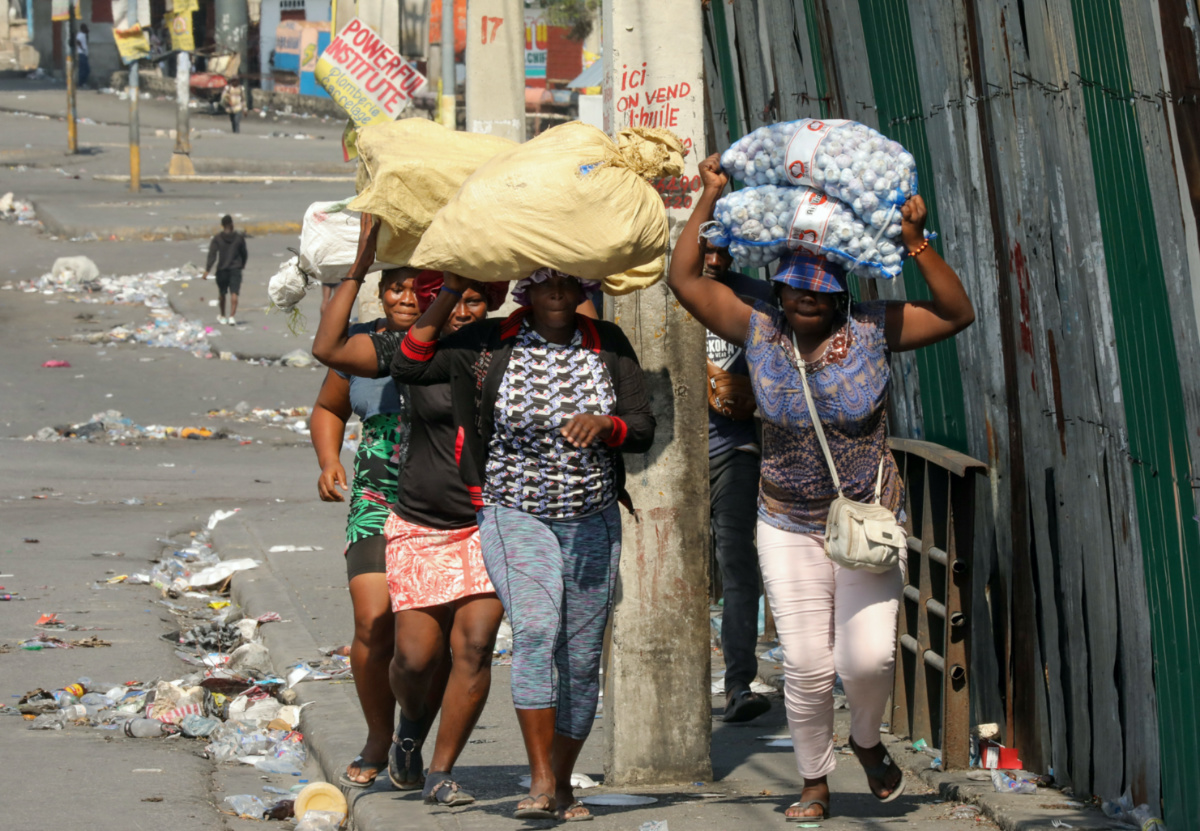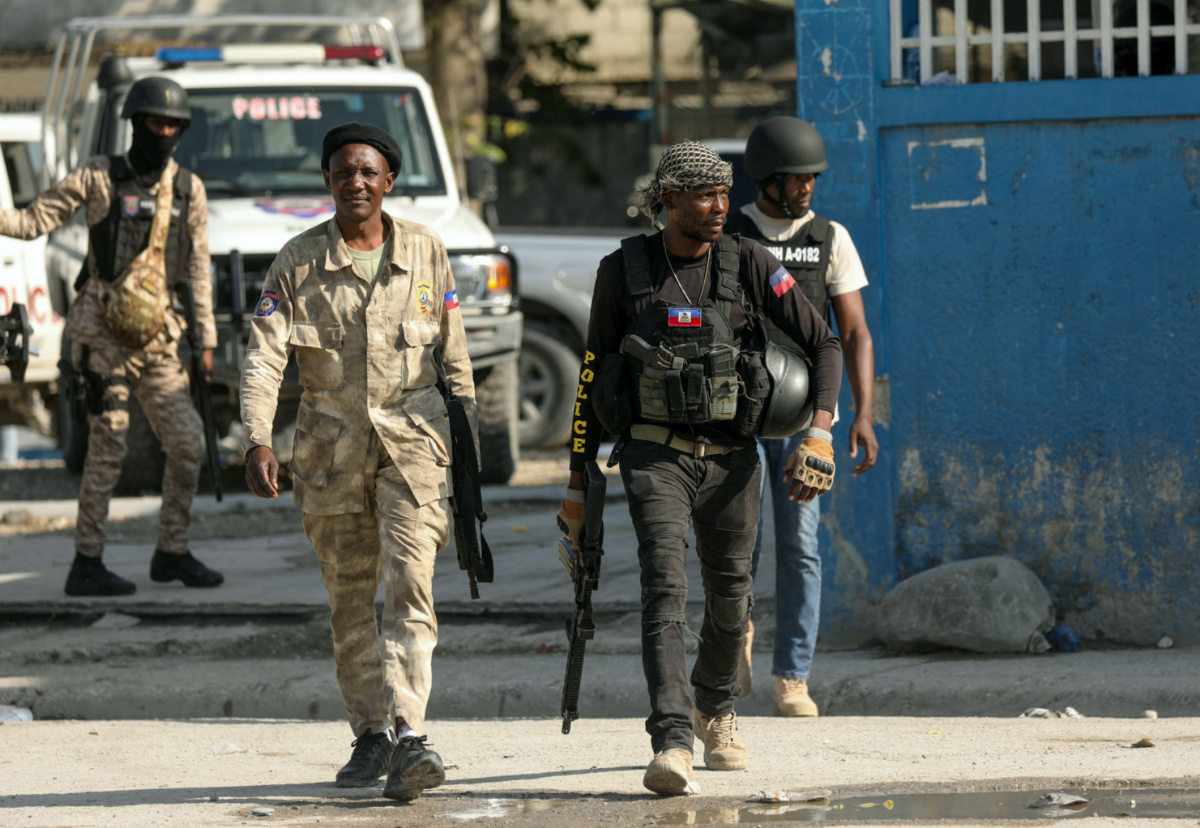Port-au-Prince, Haiti
Reuters
Haiti’s government on Thursday said it would extend a state of emergency around Port-au-Prince for another month following a wave of gang violence that has threatened to bring down the government and led thousands to flee their homes.
The UN humanitarian affairs agency on Thursday warned that the country’s health system was “nearing collapse,” with shortages of staff, equipment, beds, drugs and blood to treat patients with gunshot wounds.

People flee their homes holding their belongings to escape gang violence, as Haiti continues in a state of emergency, in Port-au-Prince, Haiti, on 6th March, 2024. PICTURE: Reuters/Ralph Tedy Erol
Two dozen trucks carrying vital equipment, medical supplies and food were stuck at the capital’s port, according to the UN’s World Food Programme, which said it had suspended its maritime transport service, citing the “insecurity.”
Authorities first announced a state of emergency on Sunday after fighting escalated, inmates were broken out of prison by armed gangs, and an estimated tens of thousands were displaced while Prime Minister Ariel Henry was in Kenya, seeking its leadership of an international force intended to fight the gangs.
The state of emergency in the Ouest Department, the seat of the capital, will be extended to 3rd April, with a nightly curfew until 11th March, according to a declaration in the Caribbean country’s official gazette. The government said this was in order to “reestablish order and take appropriate measures to retake control of the situation.”
The state of emergency bans all public protests, day and night, and allows security forces to use “all legal means” at their disposal to enforce the curfew and apprehend those who break it, the government said, adding emergency services, security forces and some journalists will be exempt from curfew.
Henry has been in Puerto Rico since Tuesday, apparently unable or unwilling to return to the capital, where gunfire has broken out around key transport hubs, including the international airport. The US has been pushing him to “expedite” a political transition.
Aid group Medecins Sans Frontieres (MSF, or Doctors Without Borders) said on Thursday it estimated that at least 2,300 people had been killed in the violence in 2023 in the Port-au-Prince neighbourhood of Cite Soleil alone, home to nine per cent of the capital’s population.
“It is likely the real scale of the violence is much higher,” MSF said. The aid group had a day earlier reopened an emergency clinic in the capital, shuttered after armed men intercepted an ambulance and killed a patient in the street.
“I’m used to seeing people killed,” a Haitian MSF staff member said in the report. “I’m used to seeing bodies on the ground. I’m used to seeing charred corpses. I’m used to hearing bangs. Sometimes it’s someone you know.”
Port closure
The situation on the ground has made it increasingly difficult for transport and aid groups to operate.
The WFP’s maritime transport service, the UN said, “is currently the only means of transporting food and medical supplies for humanitarian and development organisations from Port-au-Prince to other parts of the country.”

Police officers patrol outside the police headquarters as Haiti continues in a state of emergency, in Port-au-Prince, Haiti, on 6th March, 2024. PICTURE: Reuters/Ralph Tedy Erol
Local media reported that armed men had broken into the capital’s main cargo port, CPS, and had looted containers.
In a statement, CPS said it had been the target of “malicious sabotage and vandalism,” forcing it to suspend its services.
There was also heavy gunfire by the airport earlier in the week, and international airlines suspended services.
We rely on our readers to fund Sight's work - become a financial supporter today!
For more information, head to our Subscriber's page.
In a statement on Wednesday, the chair of the Caribbean Community (CARICOM) said regional leaders were meeting “around the clock” with government and opposition representatives, but had not yet reached consensus on how to proceed.
Henry, who is unelected, came to power shortly after the assassination of former President Jovenel Moise. He has repeatedly postponed elections, saying security must first be established to hold a free and fair vote.
Martine Moise, the president’s widow who was charged last month alongside some 50 other people for involvement in the 2021 assassination, said on X Haiti was “upside down” because those in power “want to crucify the victims, make them responsible, while they who are the killers seek to stay in power.”
Gangs have massively expanded their influence and territory in the years since Moise’s death, amassing wealth from ransom kidnappings and large arsenals of firearms believed to be largely trafficked from the United States.
– With reporting by SARAH MORLAND in Mexico City, Mexico; DON PESSIN in Washington DC, US; and MICHELLE NICHOLS at the United Nations






